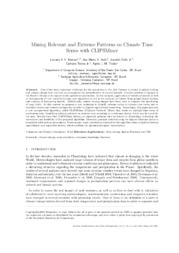Mining relevant and extreme patterns on climate time series with CLIPSMiner.
Mining relevant and extreme patterns on climate time series with CLIPSMiner.
Author(s): ROMANI, L. A. S.; ÁVILA, A. M. H.; ZULLO JÚNIOR, J.; TRAINA JÚNIOR, C.; TRAINA, A. J. M.
Summary: One of the most important challenges for the researchers in the 21st Century is related to global heating and climate change that can have as consequence the intensification of natural hazards. Another problem of changes in the Earth's climate is its impact in the agriculture production. In this scenario, application of statistical models as well as development of new methods become very important to aid in the analyses of climate from ground-based stations and outputs of forecasting models. Additionally, remote sensing images have been used to improve the monitoring of crop yields. In this context we propose a new technique to identify extreme values in climate time series and to correlate climate and remote sensing data in order to improve agricultural monitoring. Accordingly, this paper presents a new unsupervised algorithm, called CLIPSMiner (CLImate PatternS Miner) that works on multiple time series of continuous data, identifying relevant patterns or extreme ones according to a relevance factor, which can be tuned by the user. Results show that CLIPSMiner detects, as expected, patterns that are known in climatology, indicating the correctness and feasibility of the proposed algorithm. Moreover, patterns detected using the highest relevance factor is coincident with extreme phenomena. Furthermore, series correlations detected by the algorithm show a relation between agroclimatic and vegetation indices, which confirms the agrometeorologists' expectations.
Publication year: 2010
Types of publication: Journal article
Observation
Some of Embrapa's publications are published as ePub files. To read them, use or download one of the following free software options to your computer or mobile device. Android: Google Play Books; IOS: iBooks; Windows and Linux: Calibre.
Access other publications
Access the Agricultural Research Database (BDPA) to consult Embrapa's full library collection and records.
Visit Embrapa Bookstore to purchase books and other publications sold by Embrapa.

